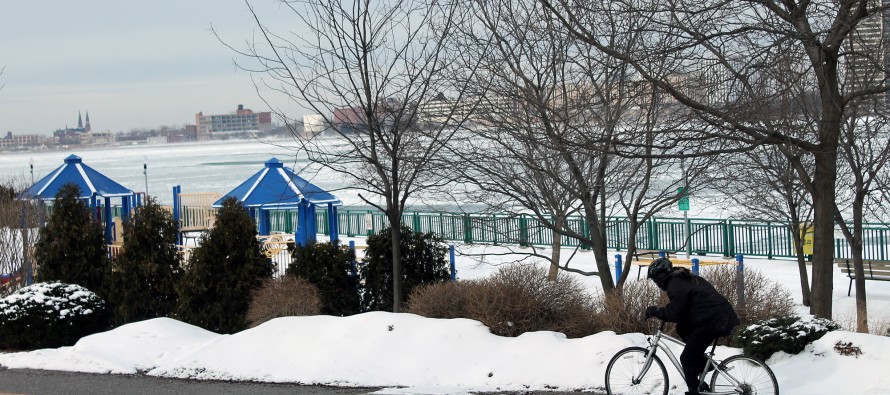Coping with the cold


A local cyclist continues peddling on the bike trail through Dieppe Gardens on Friday, January 24, 2014. Despite the extreme cold weather conditions, he is one of the very few people facing the cold today. (PHOTO BY – Jessica Curtis)
by Jessica Curtis
Health officials are warning the public that only a few minutes of exposure to the extreme cold weather could increase their chances of getting hypothermia or frostbite.
Medical Officer of Health for the Windsor-Essex County Health Unit, Dr. G. Allen Heimann issued a cold weather alert on Monday, Jan. 20 cautioning Windsorites to keep warm to prevent frostbite, hypothermia, and other health complications. The alert will be in effect until Saturday, Jan. 25.
“When exposed skin tissue freezes, individuals can develop frostbite,” said Heimann. “It’s characterized by a loss of feeling and colour-loss in part of the body, most often where the skin was exposed or damp and cold.”
Warning signs of frostbite include white or grayish-yellow areas on the skin, numbness and skin that feels firm or waxy.
The health unit also warns that hypothermia, another danger of extremely cold temperatures, can occur when the body loses heat faster than it is produced. Warning signs of hypothermia in adults include shivering, exhaustion, confusion, memory loss, slurred speech and drowsiness. In infants, bright red cold skin and very low signs of energy are signs of hypothermia.
So far there haven’t been any extreme cases of hypothermia or frostbite in Windsor this winter season.
“People are using good judgement,” said Ron Foster, Windsor Regional Hospital’s vice-president of public affairs. “We’re mostly just monitoring those affected by the influenza and visitor restrictions.”
Health officials warn that it’s important to seek medical attention as soon as possible if hypothermia or frostbite is suspected.
Individuals most at risk for hypothermia include the elderly, babies sleeping in cold bedrooms and people who are outdoors for long periods.
The health unit advises people to stay warm and dry. Adults and children should wear appropriate clothing and check frequently for signs of hypothermia or frostbite. People with heart disease or high blood pressure should avoid strenuous outdoor activities.
Windsorites are reminded by the Health Unit to keep up to date with weather conditions to ensure that they have a safe winter season.


